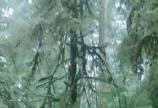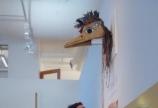Witnessing, study and practicing reciprocity
- Anne MacLaurin
Growing up sailing the South Pacific with his family, Bradley Clements learned the importance of communication between visitors and locals. The elements of mutual respect between his family and island inhabitants—learning about local culture and customs in real-world settings—stayed with Clements as a lifelong lesson.
Predominately homeschooled by his parents during their years of world travelling, Clements eventually returned to the family’s home-base in Victoria, attending Camosun and eventually UVic—graduating later this month with a bachelor’s in anthropology.
Initially considering medieval studies or urban geography at UVic, Clements was drawn to Dr. Andrea Walsh’s applied anthropology class where he first learned how anthropology could be useful in First Nations reconciliation and decolonization. As her research assistant, he worked with the Aller Collection of Residential School children’s art, the Alberni Valley Museum, the Legacy Art Gallery, and met with residential school survivors. That work led Clements to travel to Ottawa during the Truth and Reconciliation Commission where he continued his work and met more survivors.
“It is an honour and privilege to work with others involved with this project, especially survivors,” says Clements. “I think that museum work can and does play a key part in reconciliation,” he continues, “when First Nations have ownership and power over their own art and materials.”
What Clements loved most about his time at UVic was the community of students and his work with Walsh. “I’ve learned so much from my relationships with my classmates, friends and teachers at UVic,” he explains. “Working with survivors, with artwork and with Andrea have been a huge inspiration.”
“For my JCURA project I listened to the experiences of visitors and Survivors when they visited the exhibit of residential school children’s art at the Alberni Valley Museum,” says Clements.
During his final year, Clements badly broke both wrists in a cycling accident. For some this would be a major setback, but Clements overcame the challenges and continued to work and finish his projects.
“I’m grateful to my friends and the anthropology staff and faculty for their kindness and understanding,” says Clements. “They were very supportive and helped me get through a difficult time.”
Clements sees that support in a wider context of building and living good relationships—a mark of how he approached his time at UVic, and of the elements of campus community he most appreciates.
“I’m amazed by all the work that so many people are putting in to making UVic a safe, empowering community,” says Clements. “I am thankful to all the advocacy groups, the Anti-Violence Project, the Men’s Circle, Native Students Union, Pride, UNI 101 and all the professors and support staff.”
Clements gained great experience (and financial support) working as an assistant curator for the Legacy Art Gallery and as a research assistant for the Residential and Indian Day School Art Research collective. He’s also grateful for an entrance scholarship and a JCURA research award that helped facilitate his studies. “Reciprocating to my community and learning from others in it has been really important to me, such as volunteering with the UNI 101 program and the Anti-Violence Project,” says Clements.
Since wrapping up his coursework, Clements has been travelling and visiting lots of museums, as well as working on the final edits of his first published paper, “The Power of Return: Repatriation and Self-Representation in the Aftermath of the Alberni Indian Residential School.”
He was also offered SSHRC funding for graduate research at four universities—and chose to continue at UVic. “I want to honour the work I began with the residential school survivors and Dr. Walsh,” he explains.


